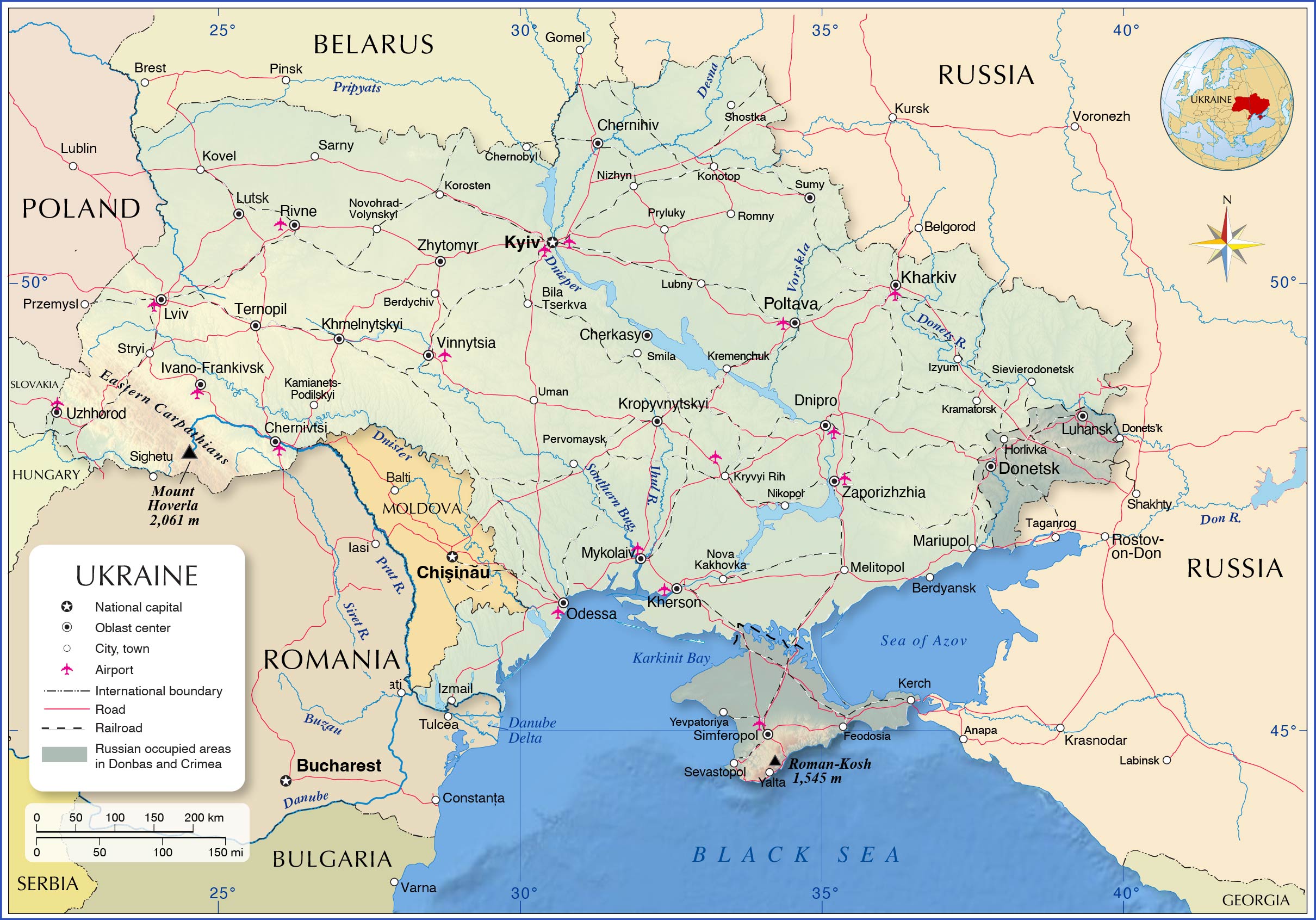Done Cookin’: Putin’s Chef Moves to Belarus [UPDATE-1]
[NB: check the byline, thanks. Updates will appear at the bottom of this post. /~Rayne]
If you have a bead on what transpired in Russia from Friday through Saturday, you’re ahead of most folks.
I’ll let VOA’s Steve Herman give a tick-tock:
1:14 p.m. ET / 8:14 p.m. Moscow —
There’s a bit more in the audio:
Dmitri @[email protected]
Prigozhin says it’s over:“They were going to dismantle PMC Wagner. We came out on 23 June to the March of Justice. In a day, we walked to nearly 200km away from Moscow. In this time, we did not spill a single drop of blood of our fighters. Now, the moment has come when blood may spill. That’s why, understanding the responsibility for spilling Russian blood on one of the sides, we are turning back our convoys and going back to field camps according to the plan.”
Audio: https://t.me/concordgroup_official/1303
1:31 PM · Jun 24, 2023
The recent order for mercenaries to sign a contract with Russia’s defense ministry does appear to be a trigger. It would be tantamount to disbanding Wagner group since its personnel would be directly subordinate to Russia’s Defense Ministry and not Prigozhin and Wagner leadership.
Many, MANY people are still scratching their heads about Belarus’s president Alexander Lukashenko acting as a peace broker.
For my part I thought Lukashenko had flown out of Belarus late last night Belarus time according to reports in social media. Indeed, The New Voice of Ukraine reported he’d left just after midnight and arrived in Turkey at 5:15 a.m. local time after taking a wide detour:
According to the map, the plane tried to bypass Russia’s Krasnodar and Stavropol Krais, flew over the Caspian Sea and then reached the Turkish resort via Georgia.
That’s nearly twice as long as necessary to get to Turkey, which one might do if concerned about missile launchers in or near eastern Ukraine/western Russia.
Why Lukashenko, who appears to be a rather inert figure save for Putin’s puppetmastery, especially since he’d been rumored to be quite sick for weeks?
At 2:20 p.m. ET the advisor to the Minister of Internal Affairs of Ukraine tweeted —
Anton Gerashchenko (@[email protected])
Former supporter of Prigozhin about alleged agreement between Prigozhin and Russian authorities:
“Now it’s finally allowed to say the three things he’s been promised. 1. Shoigu’s resignation. 2. Amnesty for “musicians” [Wagner mercenaries]. 3. The possibility to return to Africa. I’m sure that in reality he signed his own death sentence. And Wagner PMC as well, of course.”
In general, many “Wagner war correspondents” are extremely disappointed with the situation.
Some publicly resign. And curse Prigozhin.
2:20 PM · Jun 24, 2023
To be fair, let’s acknowledge before Prigozhin’s feint over the last day either Putin and/or Shoigu wanted to seize control of Wagner group personnel directly to augment what’s left of Russia’s armed forces.
But Prigozhin signing his own death warrant? Hmm — who’d execute it?
In the course of sorting through all the feeds and news articles related to the last 24 hours in Ukraine and Russia, I ran across several social media reports regarding the parties to the negotiations with Prigozhin. It contained a tidbit which at the time the deal was reported didn’t seem important.
Now I realize it may have been critical to understanding why Prigozhin traded away what looked like his leverage by stopping the march to Moscow and reversing Wagner personnel’s direction back to Rostov and the front.
In these reports it was noted Lukashenko was not the actual negotiator but that the other participant was key to the process — Tula’s governor Aleksey Dyumin. Lukashenko may instead have been a guarantor of the deal while Dyumin, a former member of FSB, GRU, presidential guard, and deputy defense minister, handled the negotiations.
Tula Oblast is a province located in Russia’s Central Federal District; its capital city, Tula, is located about 140 miles/224 km south of Moscow.
The M4 highway on which Wagner group personnel convoy worked its way toward Moscow runs right through the heart of Tula Oblast.
One could see why Tula’s governor might have a vested interest in negotiating a de-escalation of tensions since the convoy might begin to run into conflict in the middle of the oblast.
But if negotiations were between Lukashenko, Dyumin, and Prigozhin, why was Lukashenko given top billing with Dyumin’s role rarely mentioned in media?
This article in Meduza from last autumn, focusing on the relationship between Prigozhin and Chechnya’s Ramzan Kadyrov, also spells out their connections to Dyumin:
Meduza’s sources also say that Kadyrov’s and Prigozhin’s criticisms of the army are silently supported by “a group of ambitious young FSO-men” — that is, Putin’s former security officers, the Governor of Tula Alexey Dyumin and the former head of the Yaroslavl region, Dmitry Mironov, who is now an assistant to the President. According to sources close to the President’s Office, Mironov and Dyumin often talk and meet in person. Sources in the Yaroslavl and Tula regions confirm this information.
A source in Tula’s regional administration points out that, even before the war, Evgeny Prigozhin collaborated with the local government – for example, by bringing political consultants to manage elections. The Insider (a media project deemed a “foreign agent” and “undesirable” in Russia) has also written about Dyumin’s connection to Prigozhin.
According to two sources close to the President’s Office, Ramzan Kadyrov got to know both Dyumin and Prigozhin when they were still Putin’s bodyguards. Apparently, Kadyrov was friendly with both of them – and even called Dyumin his “elder brother.”
“FSO men” — members of the Federal Protective Service which includes Putin’s guards. What an interesting common link.
Lukashenko is also connected to Dyumin economically; Belarus and Tula Oblast have swapped commodities since a deal last autumn. It’s possible this is a means to get around sanctions on Russia though it’s not clear from financial reporting.
But Lukashenko has another relationship which hasn’t surfaced in all of today’s reporting. Belarus has been useful to Wagner group:
The last weeks of the 2020 presidential election campaign in Belarus brought an unexpected development: on July 29th, Belarusian authorities arrested 33 Russian citizens who allegedly belonged to the Wagner Group. While Belarusian President Aleksandr Lukashenko used the story of the arrested Wagner operatives for his election campaign, accusing them of planning to interfere with the elections, independent sources revealed that, in fact, the Wagner Group has been using Belarus regularly as a transit country to various operational theaters; thus their presence on Belarusian territory was by no means extraordinary.
Wagner uses Belarus to move to its other operations and programs while it also proved useful as a scapegoat — or willing partner — in the 2020 election.
One of the sources which mentioned Dyumin was the real negotiator also said he was the likely next Russian Defense Minister.
Which means that Dyumin may have had a vested interest in looking useful to Putin, making sure the negotiations included the removal of Sergei Shoigu as Defense Minister, and that Prigozhin would get something out of this show of force demanding Shoigu’s ouster.
Was all of this just theater by a handful of buddies who had shared histories in order to shift one of them into Defense Minister — the guy who’d likely award contracts to mercenaries?
~ ~ ~
One other critical point to keep in mind about Russian private military companies (PMCs) like Wagner: they don’t technically exist in Russia. They’re not licensed in any way; the government looks the other way allowing weasel words to justify companies having their own security. They’re meant to be a means to do off-the-books work so they aren’t in public or government records.
By being off-the-books, Putin can opt for maximum plausible deniability while keeping head count and subsequent losses out of the public eye, undocumented by Russian Ministry of Defense in casualty reports.
Between this fact and the Defense Ministry’s move to consolidate head count between regular armed forces and PMCs, Putin and/or Russian military’s top brass can hide the mounting Russian casualties in Putin’s misbegotten war on Ukraine.
Prigozhin didn’t spell this out directly, but he did point out that he felt Wagner was going to be broken up. He made this seizure of his PMC public if not on the books, and he punctuated it with the march, ensuring the head count Wagner committed to this statement was in the public’s consciousness.
Which brings up another point: responsible as he was for the Internet Research Agency troll farm which has screwed with the U.S. through online influence operations since 2013, Prigozhin knows how to influence perception and public opinion even with this march on Moscow.
How much of the march was an influence operation?
How much of the subsequent negotiations and the response of other key players was an influence operation?
Who was the intended target of the operation(s), if that’s what Wagner group’s weekend’s march toward Moscow was?
What was the ultimate intent of the operation(s), assuming that’s what this was, apart from the concessions revealed to the public?
~ ~ ~
It will be quite some time before all the details fall into place to explain what really happened.
Ukrainians may be amused by some of it, may have taken advantage of the situation by pressing east along the front during the confusion, but Russian missiles continued to fall on Ukraine. Three died when Kyiv was hit though Ukraine’s air defenses managed to deter 80% of the attempted strikes.
The U.S. intelligence community, though, had information suggesting Prigozhin could attempt a coup two weeks ago.
At least one news report suggested this possibility the last week of May.
Let’s hope Ukraine had been informed and will continue to be informed about another potential coup. With Putin’s grip on power proven weak by Prigozhin, it’s more likely there will be more marches toward Moscow ahead, increasing confusion in Russia about its leadership, and improved opportunities to seize more of eastern Ukraine and Crimea.
~ ~ ~
UPDATE-1 — 11:45 A.M. 26-JUN-2023 —
Kevin Rothrock, managing editor at Meduza (English), reported Prigozhin uploaded an audio recording which was more than 11 minutes long some time before 10:30 a.m. ET/5:30 p.m. Moscow time. Rothrock has published both a Russian and an English transcript though both are AI generated.
This is the English transcript:
Today I opened the press service and received thousands of questions about the events. In order to avoid misunderstandings, I want to answer the main of these questions. First. What were the prerequisites for Masha Justice on 06/23/23? PMC “Wagner” is perhaps the most experienced and combat-ready unit in Russia, and possibly in the world. motivated, charged fighters who performed a huge number of tasks in the interests of the Russian Federation and always only in the interests of the Russian Federation, in Africa, in the Arab countries and around the world. Recently, this unit has achieved good results in Ukraine, having completed the most serious tasks.
As a result of the intrigues of ill-conceived decisions, this unit was supposed to cease to exist on July 1, 23. A council of commanders gathered, which brought all the information to the fighters. No one agreed to sign a contract with the Ministry of Defense, since everyone knows very well from the current situation of their experience during the NWO that this will lead to a complete loss of combat capability. Experienced fighters, experienced commanders will simply be smeared and will actually go to the meat, where they will not be able to use their combat potential and combat experience. Those fighters who decided that they were ready to move to the Ministry of Defense did. But this is the minimum amount, calculated by a percentage or two. All the arguments that were in order to keep the Wagner PMC safe and sound were used.
But none were implemented. in an attempt to enter into any other structure where we can really be useful. We were categorically against what they want to do. At the same time, the decision to transfer to the Ministry of Defense and understanding our attitude to close the Wagner PMC was made at the most inopportune moments. Nevertheless, we put the equipment on the grass, collected everything that was needed, made an inventory and were going, if the decision was not made, to leave on June 30 in a column to Rostov and publicly hand over the equipment near the headquarters of the NWO. Despite the fact that we did not show any aggression, we were attacked by missiles and immediately after that the helicopters worked. About 33 fighters of PMC “Wagner” were killed. Some were injured.
This prompted the Council of Commanders to immediately decide that we should move out immediately. I made a statement in which I said that we are not going to detect aggression in any way. But if we are hit, we will take it as an attempt to destroy and give an answer. During the entire march, which lasted 24 hours, one of the columns went to Rostov, the other in the direction of Moscow. During the day we covered 780 kilometers. Not a single soldier on earth was killed. We regret that we were forced to strike at air assets, but these assets were dropping bombs and delivering missile strikes. During the day we covered 780 kilometers, short of 200 small kilometers to Moscow. During this time, all military facilities that were along the road were blocked and neutralized. Nobody died, I repeat once again, from those who were on the ground. And this was our task. Among the fighters of the Wagner PMC, several people were wounded and two dead, who joined us, military personnel and the Ministry of Defense, of their own free will. None of the fighters of PMC “Wagner” was forced to this campaign, and everyone knew his ultimate goal.
The purpose of the campaign was to prevent the destruction of the PMC “Wagner” and to bring to justice those persons who, through their unprofessional actions, made a huge number of mistakes during the SVO. It was demanded by the public. All the servicemen who saw us during the march supported us. We did not reach about 200 kilometers to Moscow, having covered 780 kilometers in one and the other direction. We stopped at the moment when the first assault detachment, which had approached 200 kilometers from Moscow, deployed its artillery, reconnoitered the area, and it was obvious that at that moment a lot of blood would be shed. Therefore, we felt that the demonstration of what we were going to do, it is sufficient. And our decision to turn around was two major factors.
The first factor is that we did not want to shed Russian blood. The second factor is that we went to demonstrate our protest, and not to overthrow the government in the country. At this time, Alexander Grigoryevich Lukashenko extended his hand and offered to find solutions for the further work of Wagner PMC in legal jurisdiction. The columns turned back and went to the field camps. I want to point out that our march of justice showed a lot of the things that we talked about earlier. Serious security problems throughout the country. We blocked all the military units of the airfield that were in our way. In 24 hours, we covered the distance that corresponds to the distance from the launch site of Russian troops on February 24, 22 to Kyiv and from the same point to Uzhgorod.
Therefore, if the action on February 24, 22, at the time of the start of the special operation, was carried out by a unit in terms of the level of training, in terms of the level of moral composure and readiness to perform tasks, like the Wagner PMC, then perhaps the special operation would last a day. It is clear that there were other problems, but we showed the level of organization that the Russian army should correspond to. And when on June 23-24 we walked past Russian cities, civilians met us with the flags of Russia and with the emblems and flags of the Wagner PMC. They were all happy when we came and when we passed by. Many of them still write words of support, and some are disappointed that we stopped, because in the march of justice, in addition to our struggle for existence, they saw support for the fight against bureaucracy and other ailments that exist in our country today.
These are the main questions that I can answer in order to exclude rumors both in Russian social networks and the media and in foreign networks. So, we started our march because of justice. On the way, on the ground, we did not kill a single soldier. In a day, only 200 kilometers did not reach Moscow, they entered and completely took control of the city of Rostov. The civilians were glad to see us. We showed a master class on how February 24, 22 should look like. We did not have the goal of overthrowing the existing regime and the legally elected government, which has been said many times. We turned around in order not to shed the blood of Russian soldiers.
There’s a lot of fuzziness in this with regards to the terms of the Ministry of Defense’s subsumption of private military companies’ personnel (and possibly assets?).
Also a lot of fuzziness in this regarding the agreement Prigozhin negotiated to end his march to Moscow.
Up to now there have been weasel words with regard to the number of Russian armed forces killed/not killed. This transcript offers more specificity though I haven’t seen much information about the aircraft shooting on Wagner personnel during the march.
Assuming this is a legitimate audio recording and not an AI-generated fake from which an AI-generated transcript has been produced, there may be a dig at Shoigu and the Russian military industrial complex with the bit about bureaucracy. Shoigu is not a soldier by training and experience but a bureaucrat.
Another dig likely aimed at Putin: the reception of Wagner group by Russian citizens. Putin gets highly-produced crowds, not spontaneous pop-ups.
Watch this video pulled together by RFE/RFL showing Prigozhin and Wagner personnel leaving Rostov-on-Don late Saturday night/early Sunday morning. That’s in part what Prigozhin made reference to in his audio.
It’s also the real, lingering threat to Putin. The video looks much more like an extremely popular politician leaving a campaign event.
There have been wisecracks made about Russia’s army being the second most powerful army in Russia and the third most powerful in Ukraine, implying Wagner group had more clout than Russia’s armed forces.
Once Wagner has left Russia, Belarus may have a more powerful army than Russia. Food for thought.







